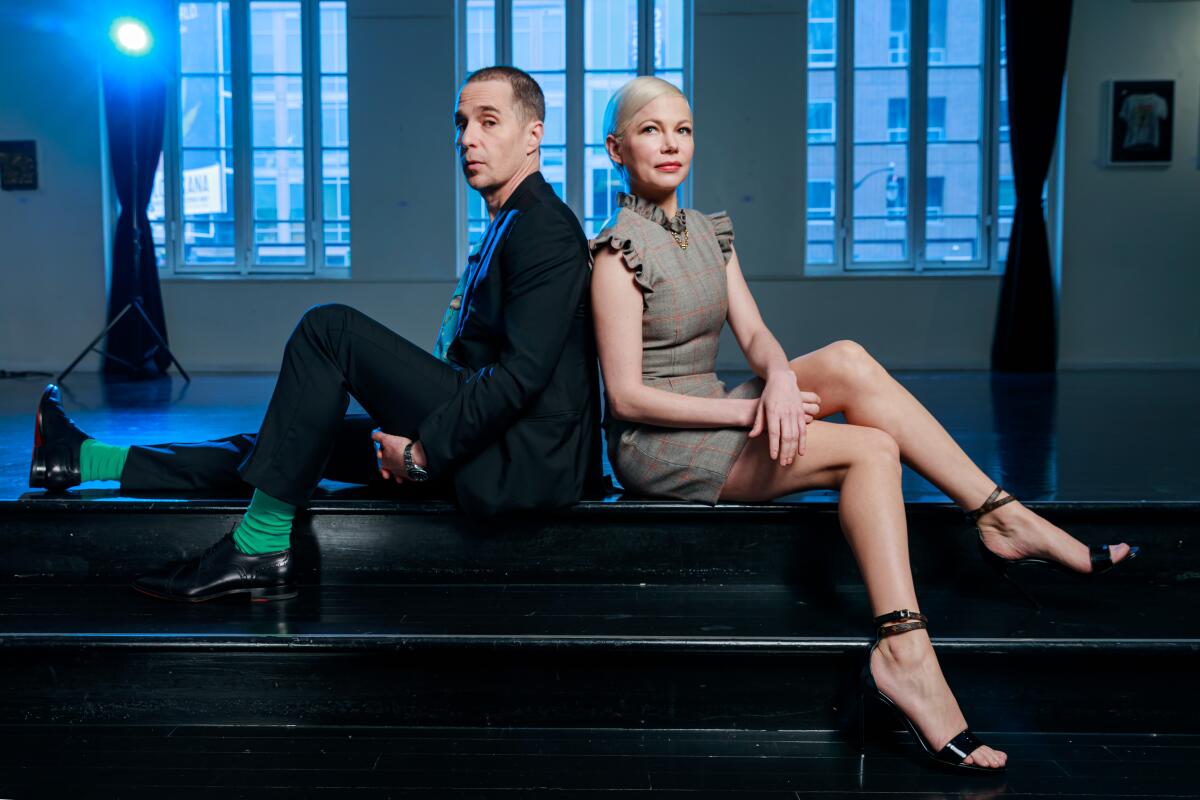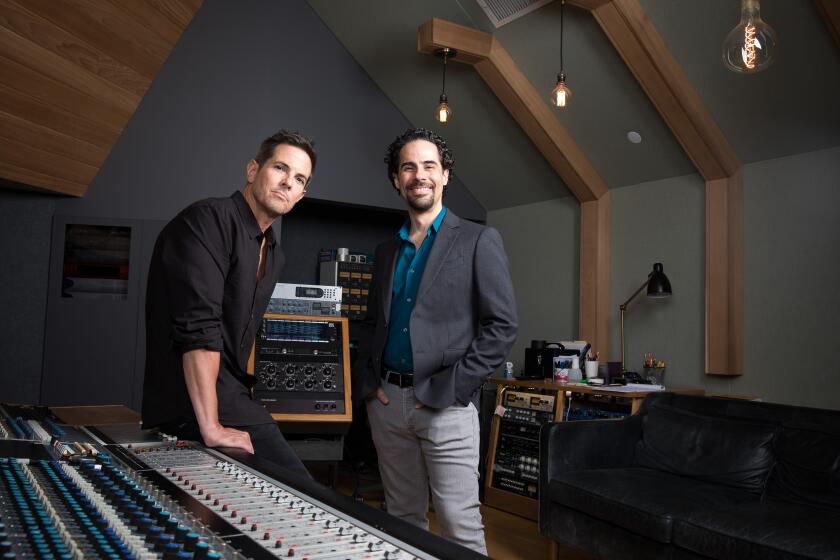Michelle Williams and Sam Rockwell are swearing off chicken and cigarettes after ‘Fosse/Verdon’

- Share via
Michelle Williams never wants to see a chicken breast again. And though Sam Rockwell used to enjoy the occasional smoke, half a year spent with a cigarette dangling from his lip has destroyed any remaining love for nicotine.
Devoting eight months to rehearsing and shooting the FX limited series “Fosse/Verdon” has left a permanent mark on the vices and diets of its two Emmy-nominated stars. Seeing each other for the first time since the production wrapped in late March, Williams and Rockwell greet each other like reunited siblings who made it through an exhausting childhood and somehow still love their demanding parents.
We convened some top TV pundits to predict who will win the Emmys. Can you do better than our experts?
“We haven’t shared our battle stories,” Williams says, holding Rockwell’s hands. She pauses, giving him the once-over, seemingly having trouble reconciling the man before her with the actor who played the balding Fosse. “I like you with hair. You look good.”
The exhaustive and sometimes exhausting eight-part “Fosse/Verdon” examined the stormy creative and romantic partnership of its title characters, Tony Award-winning dancer Gwen Verdon and Broadway choreographer and film director Bob Fosse. The couple collaborated on Broadway hits (“Damn Yankees,” “Chicago”) and the Oscar-winning film version of “Cabaret.”
“Fosse/Verdon” devoted episodes to these projects, relishing the pair’s showbiz history, which included relationships with Neil Simon, Paddy Chayefsky and Liza Minnelli. The series also served as a corrective, establishing Verdon’s crucial contributions to the self-loathing Fosse’s successes.
“I wasn’t fully aware of her legacy and the extent of her invisible handprint on his career until this,” Williams says, adding she wouldn’t have done the series if it had merely been a standard depiction of a great, flawed man. After Williams was cast, “Fosse/Verdon” became an equal partnership and, in the process, evolved into an empathetic, honest look at gender inequities.
“Gwen shouldered the load professionally and in their life together too,” Williams adds. “She had to sacrifice a lot to get what she deserved.”
Williams and Rockwell are tucked inside an office at the motion picture academy’s Beverly Hills headquarters. They’re here for a “Fosse/Verdon” Emmy event and outfitted accordingly, Williams wearing a black cardigan and leopard print skirt and Rockwell rocking a burgundy print suit. Rockwell lets his costar do most of the talking, affirming most of her recollections with an emphatic “yeah” that carries vestiges of the Texas accent he employed playing George W. Bush in “Vice.”
He repeatedly likens making “Fosse/Verdon” to filming four independent movies — two months of prep, six months of filming, 16-hour days, weekends spent learning lines, countless packs of cigarettes and, for him, huge chunks of time spent lugging around his beloved German shepherd in order to strengthen his core for the series’ dance numbers.
Verdon and Fosse each went through emotional upheavals at a young age. As a teenager, Verdon was forced to marry a family friend who impregnated her; Fosse’s sexuality became forever complicated when he was molested by fellow burlesque dancers early in his career.
“They had similar traumas but dealt with them in different ways — she wanted to go out, he wanted to go in,” Williams says. “That probably made it insufferable to live together but is also probably what brought them together in the first place.”
“They were two broken people who needed that buzz, that showbiz fix,” Rockwell adds. “I relate to that.” He turns to Williams and, again, they clasp hands. “I think you relate to that too. You gotta bleed a little bit. What’s the point if you don’t leave a little blood on the stage?”
“When you’ve been to the moon, it’s hard to return to Earth,” Williams replies softly. “These two people were stage animals and they became addicted to the audience giving them a love and approval that they didn’t have when they were children, a love and approval that made them feel whole. And I think both of them struggled to figure out how to get that love when they weren’t onstage.”
Alex Lacamoire and Steven Gizicki joined up to create the musical beats for FX’s limited series “Fosse/Verdon.”
Williams and Rockwell agree that it’s strange they’d never worked together before “Fosse/Verdon.” Rockwell, 50, lives in the East Village with his longtime girlfriend, Leslie Bibb, and has long been active on the New York stage. “I’ve been to all his plays,” says Williams, 38, a fellow New Yorker, who has done a fair amount of stage work herself, including nearly a year playing Sally Bowles in “Cabaret.” They both cop to being “theater nerds” and gravitate toward indie film projects.
“We should have been so many other people to each other at this point,” Williams says. “I guess we made up for lost time doing this.”
Rockwell has never spent more than three or four months on a play, and when Williams tells him about the year she spent on “Cabaret,” he needs about a minute to process that kind of commitment, whispering, “wow,” “that’s a lot,” “a year … I can’t believe it” while Williams talks about the mental toll it took on her. For “Fosse/Verdon,” she trained and dieted (no carbs, lots of animal protein … hence the permanent aversion to chicken breasts) and never had a day off. But she could always ask for another take while filming a movie or TV project. Onstage, she notes, there’s no such safety net.
“ ‘Fosse/Verdon’ was harder technically, emotionally, physically, logistically,” Williams says, comparing the projects, while Rockwell intones, “For a year? Jesus!” “But spiritually … it’s hard to get up in front of a thousand real people every night. You’re so exposed. There’s nothing to hide behind. And, for better and for worse, you can feel the audience strongly and it imprints on you. I just felt raw doing it. It was crucifyingly difficult.”
“When you hear people in the audience coughing, that’s what gets me,” Rockwell says. Williams covers her face. “The coughing … it’s excruciating.”
Would she do it again? Of course, she replies.
“There’s that scene in the last episode when Gwen does the benefit for Staten Island Mental Health,” Williams says, explaining. “That’s where her stage is at that point in her life. It’s a small stage, but she still takes it. She’s a fish and she needs to swim. She needs that water to live. So if there’s a puddle, she’s going to jump in.”
“What actor can’t relate to that?” Rockwell asks.
“If they’re being honest, each and every one,” Williams answers.
More to Read
From the Oscars to the Emmys.
Get the Envelope newsletter for exclusive awards season coverage, behind-the-scenes stories from the Envelope podcast and columnist Glenn Whipp’s must-read analysis.
You may occasionally receive promotional content from the Los Angeles Times.












